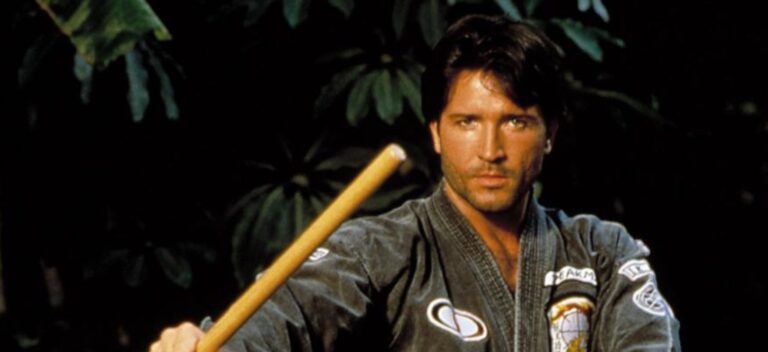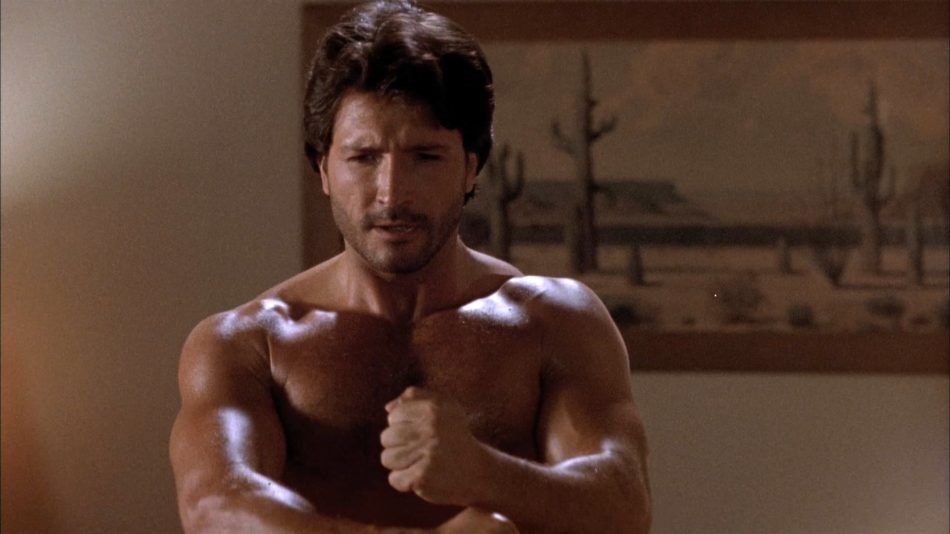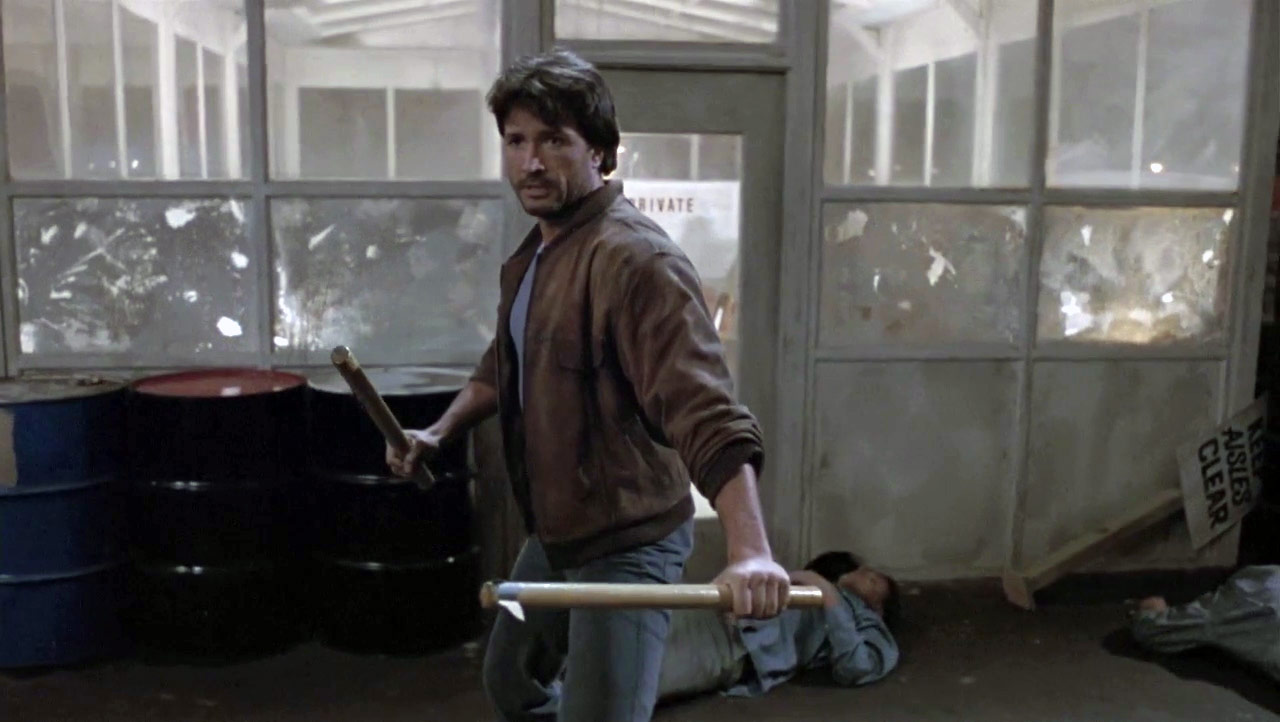
A look back at the ultimate action career and legacy of Jeff Speakman with his breakout role in The Perfect Weapon (1991).

It’s a very good example of the vitality of a good story shining through the bad decisions that can be made through the production of a film, both intentional and accidental. This film is also a great example that illustrates the primary criteria that defines a competent action film.
The premise: Jeff Sanders (Jeff Speakman), is a highly skilled Kenpo martial artist in exile from his town, his home, and his dojo after a failure to control his youthful rage leads to him critically injuring a jock.
Honor-bound, Jeff returns from exile years later to look into the suspicious death of his father figure, Kim (Mako), which may be connected to the increasing presence of the Korean mafia in the local Asian community.
My original intention when I first started doing these write ups was to bring attention to underseen Italian films-known variously as spaghetti cops and robbers, poliziottesco, or Eurocrime-that I strongly feel are predecessors, and had an influence on, North American action films.
And I’m still committed to that, but I’d like to expand the scope of that mission to define the criteria of what makes an effective action film by creating a standard measure system. To accomplish that I need to take a brief detour from Eurocrime to explore a fraction of the filmography of one Jeff Speakman. In the early 90s Speakman was a rising star in action films, and one of his goals was to introduce and promote the martial art of Kenpo, and in The Perfect Weapon he partly succeeds at this.
An Introduction to Jeff Speakman
From the above stated premise Jeff arrives in town and starts asking questions, his investigation paralleling that of his younger brother, Detective Sanders. Jeff is not persuaded by threats from the police to lay off. He’s on the mythical Quest, walking the same lone path that Marlowe, The Continental Op, Lew Archer, Sam Spade, and Mike Hammer walked before him. Jeff’s Quest for the truth leads him to a dojo. After being told to buzz off, Jeff makes an offer to permanently leave them alone if the best student in the dojo can kick his ass. This offer rewards Jeff with all the students fighting him. At once. And here we’re introduced to the Primary Criteria of the effective action film:
- Does the film support the hero?
Let me restate that. Though I will be writing about films specifically here, I want this criteria to apply to other forms of media, and for that we need to go back to the framework.
- Does the story structure and pacing showcase the protagonists abilities without making him infallible? (By this criteria all Steven Seagal films fail, as awesome and fun as they are.)
Let me try a broader definition that is not limited to just combat:
- Does the story’s structure and pacing place increasing demands on the protagonist’s abilities, forcing him to expand his skillset by engaging both his mind and body in the process?
In the case of The Perfect Weapon, the answer is an emphatic yes. In the aforementioned scene Jeff gets worked over pretty badly by the dojo students, but his Kenpo allows him to overcome the fighters in an action sequence that has a visceral, thrilling, and rough quality. It’s refreshing to see a fight scene that doesn’t feel choreographed to death and leaves room for improvisation and mistakes. Jeff also gets the information he wanted to continue his Quest.
The Development of the “Perfect Weapon”

The premise and set up are strong, but in the middle The Perfect Weapon becomes muddled. I speculate that the through-line clarity of the story clashed with the needs of the producer, writer and director. A lot of time and money was invested in a car chase that was shot awkwardly, and then ends as unintentional comedy when police officers try to arrest henchman Tanaka (Professor Tanaka), and Tasers aren’t enough to take him down. The need for “production value” gets in the way of the straightforward revenge tale to the film’s detriment.
But even through the uneven tone of the middle act, we get very satisfying moments of the Primary Criteria. Jeff walks into a club filled with angry patrons who make it very clear he’s not welcome. Jeff tries to beat some answers out of people, to be knocked unconscious and dumped in the back alley. Force has failed him, and Jeff has to resort to resourcefulness to forge ahead.
And here we could get into issues like the stated production budget for the film (10 million.) Aside from the unimpressive car chase I mentioned earlier, I don’t see where all the money went on the screen. But this is a minor point in a film that delivers visceral action in the shape of a magnetic, single-minded, driven protagonist. The purpose of establishing a Criteria of effective action films is to get away from rewarding films with high budget gloss and lack of clarity (the Mission Impossible films versus Jack Reacher), and faulting films that can’t compete with Hollywood money, but offer thrills and mind-blowing action within their restrictions. (Asian action films.) Such reviewer criteria belongs to YouTubers and podcasters who need to make a specific length of content to maintain their subscription numbers.
Land of the Free: Jeff Speakman Brings Some Politically-Fueled Action
But How Ultimate is it?
In The Perfect Weapon we have the flawed but determined Jeff trying and failing to keep his temper as his Quest is sidetracked by Yung (Dante Basco.) Yung uses the wall of silence running through the Asian community to deceive Jeff into believing that Kim’s killer is a local crime boss named Sam. Jeff is seething with rage. Retribution feels very close, and without wasting time he breaks into Sam’s home in a thrilling sneak and attack sequence that concludes with Jeff staring down Sam, his hands on Sam’s neck. (No gun. No knife. No equal. The movie poster promises, and it doesn’t lie.)
Jeff is saved from making a fatal mistake by Jimmy Ho (Dante Basco), Sam’s nephew. Jimmy informs Jeff that it was Yung who had Kim killed to take ownership of Kim’s antique shop and use it as a criminal front, and that the misinformation he fed Jeff was for Yung to use Jeff as a tool in removing Sam, Yung’s rival.
In the cinematic sense, Jeff is on a Quest for justice while struggling to control the temper that had him banished from his dojo, his second home. In the metaphorical (behind the scenes) sense Jeff Speakman is struggling to maintain the purity of his vision of Kenpo against the whims of the producers, the Primary Criteria that strips the action hero to its essence.
And one chance at redemption appears. Yung is planning to leave the country. Jeff finds out, and heads to the local docks, where after going through a gaggle of henchmen and lead villain Tanaka, Jeff captures Yung, and hands him over to the police, letting go of his homicidal rage, to be welcomed back to the fold of his family and his dojo.
The Perfect Weapon is a flawed and promising film. In spite of the odd detours there’s a forcefulness of purpose that makes itself felt through the movie’s runtime. It’s such a vital film that it became the standard bearer for the effective action film, and the mold of the Primary Criteria. Check it out! If you’ve already seen it, then watch it again!
Article by Melvin Cartagena – born and raised in Puerto Rico on a diet of mainstream, cult and action movies. Currently resides in Massachusetts where he writes fiction and nonfiction, and writes and draws comics. You can see his work on YouTube at RoboPulp Media.
Great movie
Comments are closed.